
| Introduction | Victorian Childhood | Philanthropy | BC Protestant Orphans' Home | References | Site Information |
CHILDREN OF THE HOME
The orphaned and destitute
Admittance to the Home
Daily schedule & Education
Adoption of children
Placement of children
Matrons
Admittance to the Home
Daily schedule & Education
Adoption of children
Placement of children
Matrons
At the heart of the BC Protestant Orphans' Home is the human story of children and their families.
The Home was a refuge
for children whose lives were altered by the death of one or both
parents or whose circumstance in life was so desperate that the living
parents chose to give them up to be raised by others. They appear in
the registry book as names and ages but each has an individual story.
Unfortunately, their personal histories and recollections are largely
unrecorded.
The extracts below give a glimpse of the real lives of the children and families connected to the Home. They are taken from correspondence in the Protestant Orphans' Home fonds at the BC Archives. Full names of the children and their families are available in the Archives but are not used here.
[See a full listing of documents.]
The extracts below give a glimpse of the real lives of the children and families connected to the Home. They are taken from correspondence in the Protestant Orphans' Home fonds at the BC Archives. Full names of the children and their families are available in the Archives but are not used here.
[See a full listing of documents.]
The Orphaned and Destitute
The BC
Protestant Orphans' Home not only took in children without parents but
also accepted children from parents or guardians who were unable to
care for them because of financial hardship. Children could be placed
in the Home permanently or on a temporary basis depending on a family's
situation. The correspondence describes cases of women whose
husbands had abandoned them or refused support. Unable to both
work and care for the children, mothers turned to the Home as a
temporary place of refuge for their children.
A following letter is representative of those received by the Home.
A following letter is representative of those received by the Home.
1895
To Charles Hayward
President of the Protestant Orphans' Home
I herewith enclose three applications for admission to the Home. They are sadly in need of a place to go as the parents being dead they have no one to look after them but elder sisters who are not fit to take care of them and I think I can get a home for the elder girls so that they can go to school. Also there is no available friends to keep them at present. The Estate is in a bad shape being encumbered and owing to the depressed times I cannot realize on it but if their [sic] is a surplus after everything is settled I will pay for their keep or in fact I will do the best I can. Hoping you will admit the orphans in the home I remain, yours respectfully, H. B., Guardian, Sidney, BC
To Charles Hayward
President of the Protestant Orphans' Home
I herewith enclose three applications for admission to the Home. They are sadly in need of a place to go as the parents being dead they have no one to look after them but elder sisters who are not fit to take care of them and I think I can get a home for the elder girls so that they can go to school. Also there is no available friends to keep them at present. The Estate is in a bad shape being encumbered and owing to the depressed times I cannot realize on it but if their [sic] is a surplus after everything is settled I will pay for their keep or in fact I will do the best I can. Hoping you will admit the orphans in the home I remain, yours respectfully, H. B., Guardian, Sidney, BC
Another case is of a mother wanting to place her daughter in the home for a time to keep her safe from the husband.
October 11 1895
Dear Sir [Mr Charles Hayward]
I am informed that it would be best to state my position to your reception committee as I am anxious to find a home for my little girl (who is six years of age). On the 10th of September last I applied to [lawyer] for a separation from my husband on account of ill treatment and bad conduct of the children. My husband's name is A.D. he has care of the grave plots at Ross Bay Cemetery. I am 33 years of age, able and willing to provide for my child. But I would like to leave her in the home for safe keeping while I am away at work until such time as I can provide a home for her myself. Yours respecfully, E.D. Fairfield Road
Dear Sir [Mr Charles Hayward]
I am informed that it would be best to state my position to your reception committee as I am anxious to find a home for my little girl (who is six years of age). On the 10th of September last I applied to [lawyer] for a separation from my husband on account of ill treatment and bad conduct of the children. My husband's name is A.D. he has care of the grave plots at Ross Bay Cemetery. I am 33 years of age, able and willing to provide for my child. But I would like to leave her in the home for safe keeping while I am away at work until such time as I can provide a home for her myself. Yours respecfully, E.D. Fairfield Road
In the
following case, a concerned person wants the Home to act in the case of
an orphaned child and to save her "from the worst life a child can
lead".
January 31 1896
Secretary, Protestant Orphans' Home
I wish to call the attention of your board to a little girl one R.G. age 9 year (half-caste) and no lawful father, her mother has left her to the mercy of friends who are poor and only able to care for themselves. In fact they say they must turn her out on the street as they cannot keep her longer and are only caring for her now until they hear an answer to this letter. Can you take this child into the Home and try in the some way to save her from the worst life a child can lead. Hoping you will consider the case favourably, I am yours respectfully, Mr J.B.
Secretary, Protestant Orphans' Home
I wish to call the attention of your board to a little girl one R.G. age 9 year (half-caste) and no lawful father, her mother has left her to the mercy of friends who are poor and only able to care for themselves. In fact they say they must turn her out on the street as they cannot keep her longer and are only caring for her now until they hear an answer to this letter. Can you take this child into the Home and try in the some way to save her from the worst life a child can lead. Hoping you will consider the case favourably, I am yours respectfully, Mr J.B.
Many applications for admission were due to the financial hardship of the family.
Sept 2 1897
To the President of the Orphans' Home
I would like if I could to place my baby in the Home for a while as I find it impossible for me to make a living and keep him with me as I have got to do sewing by the day and have no place to leave him. He is one year and three months old and is very healthy and I can promise he will not be any trouble at night as he goes to sleep at 7 o'clock in the evening and does not wake again before morning. My husband has been very unsuccessful in what he has undertaken and I do not expect any help from him now before the Spring as he has gone up north. I would like to put in as much time as I can during the Fall months and I feel sure my baby would be well cared for from what I have heard of the Home. I feel quite confident I will be able to pay for his keeping if not to high if you can take him for the Fall months at least you will greatly oblige me. Mrs. M.
To the President of the Orphans' Home
I would like if I could to place my baby in the Home for a while as I find it impossible for me to make a living and keep him with me as I have got to do sewing by the day and have no place to leave him. He is one year and three months old and is very healthy and I can promise he will not be any trouble at night as he goes to sleep at 7 o'clock in the evening and does not wake again before morning. My husband has been very unsuccessful in what he has undertaken and I do not expect any help from him now before the Spring as he has gone up north. I would like to put in as much time as I can during the Fall months and I feel sure my baby would be well cared for from what I have heard of the Home. I feel quite confident I will be able to pay for his keeping if not to high if you can take him for the Fall months at least you will greatly oblige me. Mrs. M.
Admittance to the Home
Applications
for admission to the Home were reviewed by the Reception Committee.
The child was required to be healthy and a physician's signature
on the application form attesting to the fact was necessary. The
cost of keeping each child was significant to an organization relying
on public donations and the parent or guardian of the child being
admitted was expected to contribute toward his keep.
A parent or guardian's ability to pay was a factor in the selection process and it has been argued that the BC Protestant Orphans' Home, like similar institutions, was elitist by choosing children with supportive social networks and rejecting children in greater need [Rooke and Schnell]. Applicants were usually rejected if the parents were alive and deemed able to care for them.
A parent or guardian's ability to pay was a factor in the selection process and it has been argued that the BC Protestant Orphans' Home, like similar institutions, was elitist by choosing children with supportive social networks and rejecting children in greater need [Rooke and Schnell]. Applicants were usually rejected if the parents were alive and deemed able to care for them.
Notes from the Reception Committee meeting of August 3, 1900 are as follows:
Boy named F.M. - 4 years old
mother unmarried - father gone away
mother in service at Mrs Marchants
-that he be admitted on payment of $8.00 per month for six months
Boy age 7 - girl age 5 of miner at Nanaimo
Admit them on the usual terms being $8.00 per month providing the father will give satisfactory guarantee for payment and provide clothing for the children
mother unmarried - father gone away
mother in service at Mrs Marchants
-that he be admitted on payment of $8.00 per month for six months
Boy age 7 - girl age 5 of miner at Nanaimo
Admit them on the usual terms being $8.00 per month providing the father will give satisfactory guarantee for payment and provide clothing for the children
Occasionally a
child taken into the care of the Home had to be removed because of
unacceptable behaviour or social problems. Welfare of the other
children is cited as the reason for the removal.
The register of children admitted to the orphanage lists the following numbers for the years 1873 to 1879:
1873 7 children
1874 20 children
1875 7 children
1876 4 children
1877 4 children
1878 5 children
1879 2 children
1874 20 children
1875 7 children
1876 4 children
1877 4 children
1878 5 children
1879 2 children
Daily Schedule & Education
Children
typically rose before 7am in the summer and 7:30am in the winter.
Bedtime varied depending on the season and the age of the child
but was between 6 and 8pm. Breakfast was served at 8am, dinner at
12pm and tea at 5pm with Grace being said before and after each meal.
A typical menu for the orphans during the week included:
Sunday - roast beef
Monday - soup and cold meat
Tuesday - boiled meat and potatoes
Wednesday - soup
Thursday - boiled meat and potatoes
Friday - soup
Saturday - soup and boiled mutton
Monday - soup and cold meat
Tuesday - boiled meat and potatoes
Wednesday - soup
Thursday - boiled meat and potatoes
Friday - soup
Saturday - soup and boiled mutton
[source: BC Archives, BC POH fonds]
Lessons were
held in the mornings between 10am and 12pm and in the afternoons for an
hour. In addition to their academic subjects of reading, writing
and arithmetic, the children were taught to sew, wash clothes, scrub
floors, wash dishes and care for the younger children.
Sundays were spent at Church and Sunday School. The children were given religious instruction and taught to pray each morning and evening.
Visitors were allowed on Saturdays between 2pm and 5pm but were not allowed at other times except with the express permission of the Ladies' Committee.
Sundays were spent at Church and Sunday School. The children were given religious instruction and taught to pray each morning and evening.
Visitors were allowed on Saturdays between 2pm and 5pm but were not allowed at other times except with the express permission of the Ladies' Committee.
The third annual report for the Home records the following information:
Too
much praise cannot be bestowed upon the Ladies' Committee who have been
so indefatigable in their supervision of - and labor for the orphans.
The children being well fed, cleanly and remarkably healthy; Not one being in bed for a day from sickness, excepting the infant who died.
The children being well fed, cleanly and remarkably healthy; Not one being in bed for a day from sickness, excepting the infant who died.
Adoption of Children
Young children
were sometimes fortunate to find homes with caring families, although
records indicate that a great many children lived at the home until
they left to find employment.
1897
Ladies and Gentlemen [The Board of the Home]
We are wishful to take a girl from the orphanage, to keep her and treat her as one of the family...
Ladies and Gentlemen [The Board of the Home]
We are wishful to take a girl from the orphanage, to keep her and treat her as one of the family...
It appears that adoptions had a trial period after which the adoptive family could return the child to the orphanage.
May 19, 1892
It was also decided to allow Mrs - to have a child now in the Home known as -- aged three years on probation for one month and if satisfactory to all parties, to afterwards adopt it.
(Cridge Centre for the Family fonds, Minute Book 2/5, City of Victoria Archives 9960102)
Children were sometimes returned to their own
families once the fincancial or social situation of the parent or
relative improved.It was also decided to allow Mrs - to have a child now in the Home known as -- aged three years on probation for one month and if satisfactory to all parties, to afterwards adopt it.
(Cridge Centre for the Family fonds, Minute Book 2/5, City of Victoria Archives 9960102)
Placement in Service
Once children
were old enough it was common practice to place them with families as
servants. Boys were typically employed as labourers and girls as
domestic help or in the care of children. The child was paid wages
for their work although it is not clear how much choice they had in
their duties or situation. Children who wished to leave their
position were accepted back into the Home, as stated in rule number 17
in the list of Matron's rules.
[from the employer of a child from the orphanage]
I distinctly understood that I was to pay to the Home $2.50 per month on account of my girl for the time she came to me until I began to pay her wages.
The situation
in which a child was placed was not always successful. There are
instances of children being returned and a different child requested,
as the following letter illlustrates.
September 1886
Dear Madam [Mrs Cridge]
I have to notify you that I have given [S.S.] of the Protestant Orphans' Home a months notice from today as I find it impossible to keep her any longer. She openly defies me and goes out night after night with young men until after 9 o'clock against my orders and this after repeated remonstrances on my part so that I am compelled to send her back and ask the ladies of the home to let me have a younger girl as soon as there is one old enough.
Yours respectfully, M. F.
Dear Madam [Mrs Cridge]
I have to notify you that I have given [S.S.] of the Protestant Orphans' Home a months notice from today as I find it impossible to keep her any longer. She openly defies me and goes out night after night with young men until after 9 o'clock against my orders and this after repeated remonstrances on my part so that I am compelled to send her back and ask the ladies of the home to let me have a younger girl as soon as there is one old enough.
Yours respectfully, M. F.
Children were often ready to leave the Home by their teenage years as the following undated letter illustrates:
Dear Mrs Cridge,
Would you kindly let me go to work at a situation for a change because I have been here ten years on the 30th of December and I wish very much to go away.
Yours sincerely, Flora S.
Dear Flora,
I read your request to the Ladies of the Committee today. We all agree that if you wish to leave the Home to work outside you may go when a proper situation is found for you. Would you like to have the charge of chldren or do you prefer housework? Remember dear child our wish is that you may be happy and useful and you will be if you go where God directs.
Your friend, Mary Cridge
Would you kindly let me go to work at a situation for a change because I have been here ten years on the 30th of December and I wish very much to go away.
Yours sincerely, Flora S.
Dear Flora,
I read your request to the Ladies of the Committee today. We all agree that if you wish to leave the Home to work outside you may go when a proper situation is found for you. Would you like to have the charge of chldren or do you prefer housework? Remember dear child our wish is that you may be happy and useful and you will be if you go where God directs.
Your friend, Mary Cridge
Matrons
Matrons were
appointed by the Ladies Committee and were given the task of attending
to the daily needs of the children, overseeing their education
and maintaining the order of the Home.
By 1886 a list of twenty-one rules for the Matron were established by the Ladies' Committee and include:
By 1886 a list of twenty-one rules for the Matron were established by the Ladies' Committee and include:
- The Matron shall take charge of all the children and instruct them in reading, writing, arithmetic and sewing, and conduct the household affairs generally, under the direction of the Ladies' Committee.
- She shall daily see to the personal cleanliness of each child and appoint a day once a week, at least, for each child to receive a thorough washing and bathing with warm water and soap, superintending the cleaning, especially that of the hair.
- She shall conduct family prayer every morning and evening with Scripture reading.
Edward & Mary Cridge
Children of the Home
Children of the Home
The orphaned and destitute
Admittance to the Home
Daily schedule & Education
Adoption of children
Placement of children
Matrons
Buildings & LandAdmittance to the Home
Daily schedule & Education
Adoption of children
Placement of children
Matrons
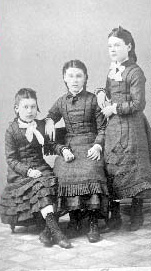
The Cridges' own children
Maude, Rhoda & Lillie, c1865
(BC Archives A-01209)
top of page
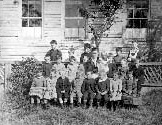
Children of the BC POH, c1880
(BC Archives B-01570)
top of page
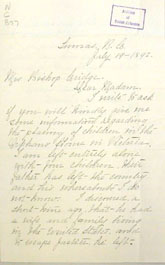
Request for admission, 1892
(BC Archives NC-B77)
top of page
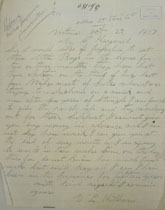
Request for admission, 1892
(BC Archives NC-B77)
top of page
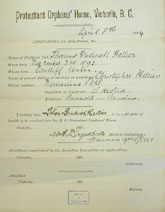
Application form, 1894
(BC Archives NC-B77)
top of page
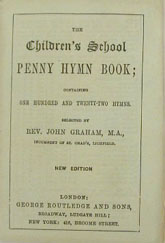
(BC Archives NC-B77)
top of page
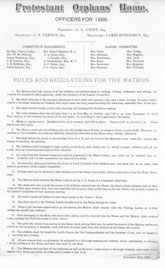
Matron's Rules 1886
(BC Archives NC-B77)
top of page
top of page

Letter from an orphan, Flora,
asking to leave the Home
(BC Archives NC-B77)
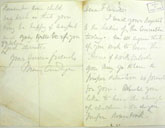
Reply from Mary Cridge
to the orphan, Flora
(BC Archives NC-B77)
top of page
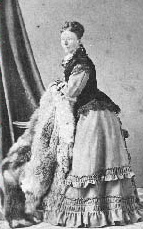
Matron of an unidentified
orphanage, c1875
(BC Archives G-09182)
top of page
© 2007 All Rights Reserved
[HOME] [VICTORIAN CHILDHOOD] [PHILANTHROPY] [ORPHANS' HOME] [REFERENCES] [SITE INFO]